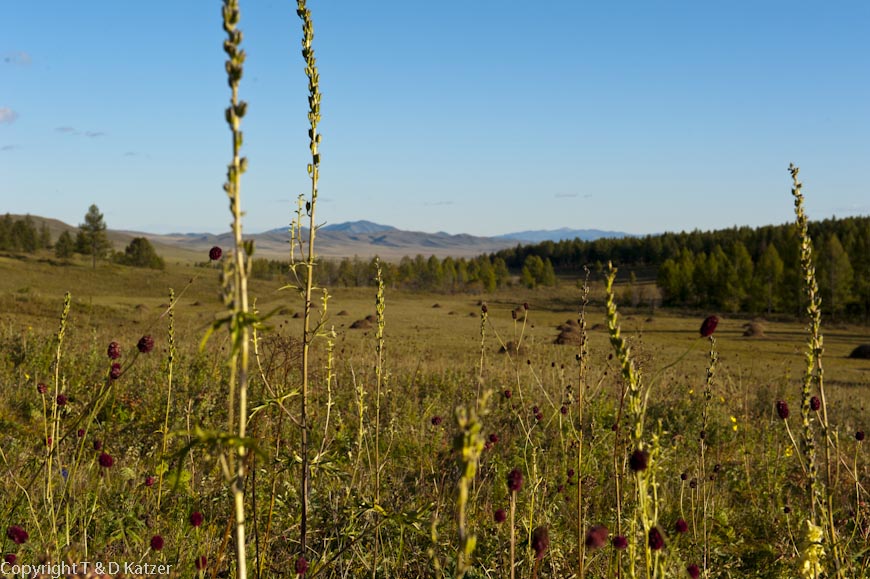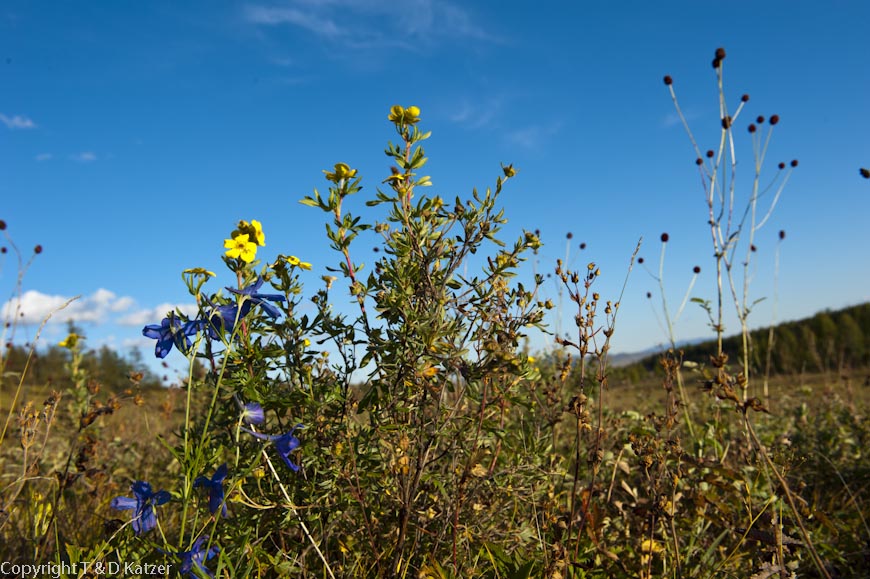
A year like a human life
N 48°59'011'' E 103°28'742''
Day: 405
Sunrise:
06:23
Sunset:
19:49
As the crow flies:
29,66
Daily kilometers:
45
Total kilometers:
2447
Soil condition:
Grass
Temperature – Day (maximum):
23 °C
Temperature – day (minimum):
18 °C
Temperature – Night:
minus 5 °C
Latitude:
48°59’011”
Longitude:
103°28’742”
Maximum height:
1600 m above sea level
Time of departure:
12:00
Arrival time:
17:10


Again, the night was relatively cold at minus 5 °C. The grass in the valley is covered in frost and ice due to the moisture emitted by the nearby stream. Mogi’s fur is also white, as if winter had already set in again. The first rays of sunshine quickly lick the frost off the grass and fur. It doesn’t take long for the thermometer to climb to 20 degrees in the sun.
Tanja has difficulty lifting the heavy load onto the horses’ backs because of her ankle, so she asks the shepherd for help. “But I’d be happy to help you,” he says with a broad grin on his face. Shortly after 12:00 noon, our small group sets off. After 14 kilometers we leave the asphalt strip, cross a river and soon reach one of our old camps. “How far is it to the next campsite?” “About another 20 kilometers on horseback,” I reply. “We could manage that, couldn’t we?” “If your foot cooperates?” “It hurts like hell but I can do it,” Tanja replies confidently, which is why we continue our trot towards the finish. Thanks to the ideal weather conditions, we make rapid progress and leave one kilometer after the other behind us. I admire my wife’s determination to cope with such a long and hard day’s riding. I hardly know anyone who would be capable of such a feat. Tanja doesn’t want to give up and especially doesn’t want to leave me alone here in the wilderness. Since the ankle has not swollen any further, I don’t think she will do any lasting damage by riding. On the contrary, the movement removes the blood that has flowed into the joint. I do not hope that the ligaments are torn but pray for a less serious ligament rupture or sprain and wish her a speedy recovery. But however it turns out, at the moment it is the way it is. We cannot change it, we can only overcome it through activism and confidence.
Shortly before sunset, I ride Naraa again to take some of the strain off Tanja. We cross another pass. Everywhere the shepherds make hay for the winter. Some of them give us a friendly wave. Others, however, are worried that we might ride down the tall grass and look at us seriously. We raise our hands in greeting, laughing, and largely avoid the grassy areas to be mowed. At the top of the pass, the first larch trees are already showing their autumn colors. The past frosty nights also took their toll on the grass and the many flowers. It is amazing how quickly a year passes, we have already experienced such weather during this trip. On the other hand, the past 12 months since we left the bilge camp feel like I have spent an entire human life in this country. The experiences were tremendous.
Shortly after 5 p.m. we reach the mountain valley camp where Mogi almost drove me mad with his constant barking. Today he is a damn good watchdog who only makes a noise when there is a real reason to do so. The time to part from him is getting closer every day. A thought that almost breaks my heart. Despite many phone calls to our loved ones at home, no one is really willing to take him in. Understandable, we are all stuck in our molded lives. Spontaneous changes are not always welcome. A dog is a member of the family that you have to get involved with. It demands a lot from its owner and changes everyday life. As our own journey through life will hopefully continue after the Mongolia expedition, we cannot offer our faithful companion a permanent home in Germany. An unavoidable fact. Apart from that, transporting a dog from Mongolia to Germany is very expensive and involves many conditions and complications. We are sure that we have found a good home for him at Badamsuren in Mörön. Perhaps he will get used to his new surroundings faster than we think. Badamsuren is an extremely lovable person who took Mogi’s heart by storm.
I wipe away my sentimental thoughts and set up our tent. As always, I then sit down in my old camp chair, type the navigation data and short recordings into the laptop and feed in the day’s photographs. “If all goes well, we’ll reach the Bilgee camp tomorrow,” I say to Tanja. “You mean the camp we left exactly one year ago today?” “Yes, exactly that. It’s on the other side of the mountain range. There,” I say, pointing to the southeast. “Tomorrow already?” whispers Tanja almost reverently. “Yes, we were very fast. Despite your injury. Today we covered 45 kilometers in just five hours. Without a horse-drawn cart, passes, rivers and other difficult terrain are much easier to negotiate. If we ever travel on horseback again, it will certainly not be with a horse-drawn cart. It makes everything much more complicated,” I say, typing some data into the laptop at the same time.
Suddenly we hear the rattle of heavy diesel engines. Two ancient mowing machines appear behind our camp. The drivers stop their ancient machines right next to the camp and look at us grimly. They let their eyes roam over the pasture where our hungry animals are grazing. We immediately run towards the men, explain where we are coming from and where we are going. “You actually come from the taiga?” asks one of them with audible admiration in his voice. “Yes, we spent the winter there. Minus 50 degrees was pretty cold and now, after almost 3,000 kilometers of riding, our bums hurt,” I say, which breaks the ice and everyone laughs heartily. Tanja offers the men a few sweets and asks if there are any horse thieves here. “With us? Ügüj, not here. But you have to be careful near Erdenet,” they warn. Because we don’t use their hayfields for more than one night, the harvesters are pleased to hear that we will be leaving early tomorrow. Then they restart the diesel engines with a heavy, iron rotary crank and chug on towards the valley. For a long time, the loud clattering of the engines is reflected by the larch forests until it finally fades away in the distance. Meanwhile, birdsong and the cry of a bird of prey can be heard. “Last year we heard the first howl of a wolf here. Can you still remember that?” I ask Tanja, who has already retired to her sleeping bag. “How could I ever forget that,” she replies.
We look forward to your comments!

